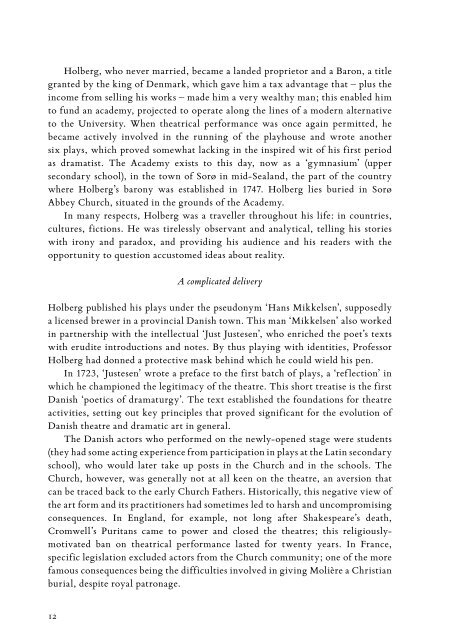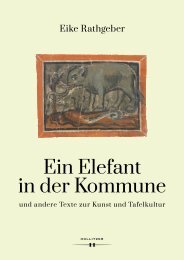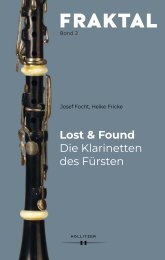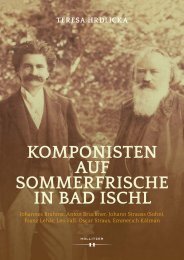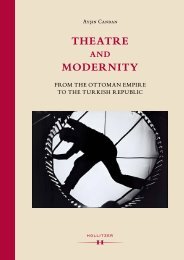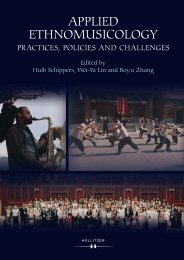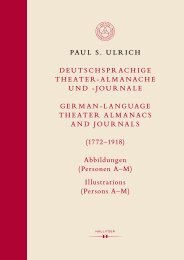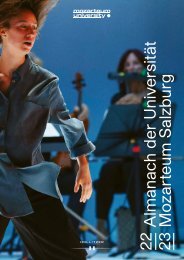Leseprobe_Holm_Holberg Plays Volume I
You also want an ePaper? Increase the reach of your titles
YUMPU automatically turns print PDFs into web optimized ePapers that Google loves.
<strong>Holberg</strong>, who never married, became a landed proprietor and a Baron, a title<br />
granted by the king of Denmark, which gave him a tax advantage that – plus the<br />
income from selling his works – made him a very wealthy man; this enabled him<br />
to fund an academy, projected to operate along the lines of a modern alternative<br />
to the University. When theatrical performance was once again permitted, he<br />
became actively involved in the running of the playhouse and wrote another<br />
six plays, which proved somewhat lacking in the inspired wit of his first period<br />
as dramatist. The Academy exists to this day, now as a ‘gymnasium’ (upper<br />
secondary school), in the town of Sorø in mid-Sealand, the part of the country<br />
where <strong>Holberg</strong>’s barony was established in 1747. <strong>Holberg</strong> lies buried in Sorø<br />
Abbey Church, situated in the grounds of the Academy.<br />
In many respects, <strong>Holberg</strong> was a traveller throughout his life: in countries,<br />
cultures, fictions. He was tirelessly observant and analytical, telling his stories<br />
with irony and paradox, and providing his audience and his readers with the<br />
opportunity to question accustomed ideas about reality.<br />
A complicated delivery<br />
<strong>Holberg</strong> published his plays under the pseudonym ‘Hans Mikkelsen’, supposedly<br />
a licensed brewer in a provincial Danish town. This man ‘Mikkelsen’ also worked<br />
in partnership with the intellectual ‘Just Justesen’, who enriched the poet’s texts<br />
with erudite introductions and notes. By thus playing with identities, Professor<br />
<strong>Holberg</strong> had donned a protective mask behind which he could wield his pen.<br />
In 1723, ‘Justesen’ wrote a preface to the first batch of plays, a ‘reflection’ in<br />
which he championed the legitimacy of the theatre. This short treatise is the first<br />
Danish ‘poetics of dramaturgy’. The text established the foundations for theatre<br />
activities, setting out key principles that proved significant for the evolution of<br />
Danish theatre and dramatic art in general.<br />
The Danish actors who performed on the newly-opened stage were students<br />
(they had some acting experience from participation in plays at the Latin secondary<br />
school), who would later take up posts in the Church and in the schools. The<br />
Church, however, was generally not at all keen on the theatre, an aversion that<br />
can be traced back to the early Church Fathers. Historically, this negative view of<br />
the art form and its practitioners had sometimes led to harsh and uncompromising<br />
consequences. In England, for example, not long after Shakespeare’s death,<br />
Cromwell’s Puritans came to power and closed the theatres; this religiouslymotivated<br />
ban on theatrical performance lasted for twenty years. In France,<br />
specific legislation excluded actors from the Church community; one of the more<br />
famous consequences being the difficulties involved in giving Molière a Christian<br />
burial, despite royal patronage.<br />
12


